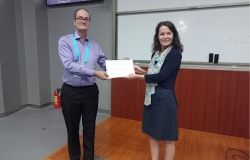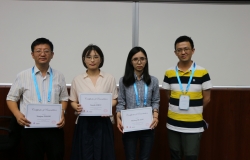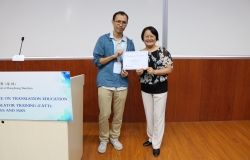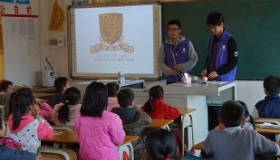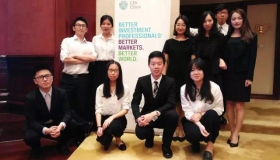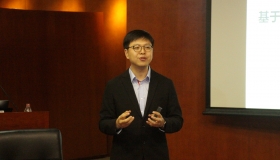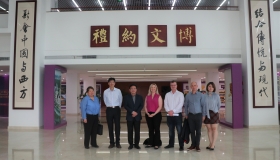The 2019 International Conference on Translation Education Successfully Held at CUHKSZ

Group photo of the conference
The conference, on the theme of Computer-Aided Translator Training (CATT): Of Machines and Man, consists of keynote speeches, parallel session presentations, a workshop and a roundtable discussion. It attracted translation educators, practitioners and language service providers from different parts of the world to meet in a two-day discussion on issues related to translation education. The conference was hosted by the School of Humanities and Social Science of CUHKSZ, with the Hong Kong Bilingual Learning and Translation Studies Association, the editorial board of Foreign Languages in China, and the Center for Translation Studies of the University of Leeds as co-organizers.
Opening Speech

President Fan Xitao delivered a speech at the opening ceremony
Professor Fan Xitao, Dean of the School of Humanities and Social Science (HSS) of CUHKSZ, delivered the opening speech and warmly welcomed the participants from different parts of the world. In his speech, Professor Fan looked back on the development of the school over the past four years. Since the launch of its first academic programme, i.e. MA in Translation and Interpreting Studies, the school has been growing steadily with the inclusion of two new programmes respectively in applied psychology and global studies. The school is set to develop more new programmes, according to Professor Fan, who concluded the opening speech with Dean’s best wishes for the conference.

Professor Wang Lidi, Deputy Dean of HSS, gave a speech at the welcome dinner
Professor Wang Lidi, Deputy Dean and Director of the translation program of the HSS, was also present at the opening ceremony and gave an address at the welcome dinner.
Keynote Speech

Keynote speech by Professor Zhu Chunshen
Professor Zhu Chunshen from CUHKSZ and Professor Mu Yuanyuan from the School of Foreign Languages, Hefei University of Technology jointly delivered a keynote speech—CATT: Putting the Mind Where the Mouth Is. Professor Zhu began by addressing the issue of human-machine relationships, stressing the importance of retaining and asserting human identity in the face of technology developments. To develop students’ confidence and independence in interpersonal, inter-lingual and cross-cultural communication as human language users, Professor Zhu pointed out, we should make full and human-oriented use of computer technologies. He also described a computer-aided translation teaching (CATT) model, and discussed its application in the construction of a unique, comprehensive and interactive online platform for distance as well as classroom teaching and learning of translation and bilingual writing.

Keynote speech by Professor Mu Yuanyuan
Professor Mu Yuanyuan elaborated on this newly-developed translation teaching and research platform, namely Textwells, enunciating its conceptual base in an ontology knowledge network designed by the research team. The platform, featuring a large number of annotation examples and exercises, have modules like parallel corpora, theory-informed text annotation, exercises, topical boards, Q&A forum, etc. According to Professor Mu, Textwells has been designed and built with a view not only to facilitating machine-aided teaching and self-learning of translation and bilingual writing, but also to providing empirical data for research in translation pedagogy, including big data, ontological and graphical representations of knowledge network related to learner behaviours, learning pathway analysis, and automatic recommendation of study solutions.

Keynote speech by Professor Mark Shuttleworth
Professor Mark Shuttleworth from Hong Kong Baptist University (HKBU) delivered a speech on Translation, Computer and Corpus. He first introduced the CAT courses offered in HKBU, with particulars such as course outlines, teaching plans and intended learning outcomes. During his speech, Professor Shuttleworth specifically discussed the use of bilingual parallel corpora, i.e. Translation Memory (TM), in translation teaching. He introduced the audience to the core advantages of TM, with reference to the online corpora resources and their characteristics. Finally he explained and demonstrated how he integrated the use of TM in CAT courses to help students start building their own Translation Memories and become more versatile analysers and users to capitalize on various text assets.

Keynote speech by Professor Hu Kaibao
Professor Hu Kaibao from Shanghai International Studies University (SISU) delivered a speech entitled Corpora in Translator Training: Applications and Implications. He first showcased current corpus-based studies of translator training at SISU, before discussing how corpora can be used in translator training in general. Professor Hu emphasized the important role of corpus in translator training, text compilation and translation quality assessment and proposed the building of learners’ corpora to study students’ translation for teaching and research purposes.
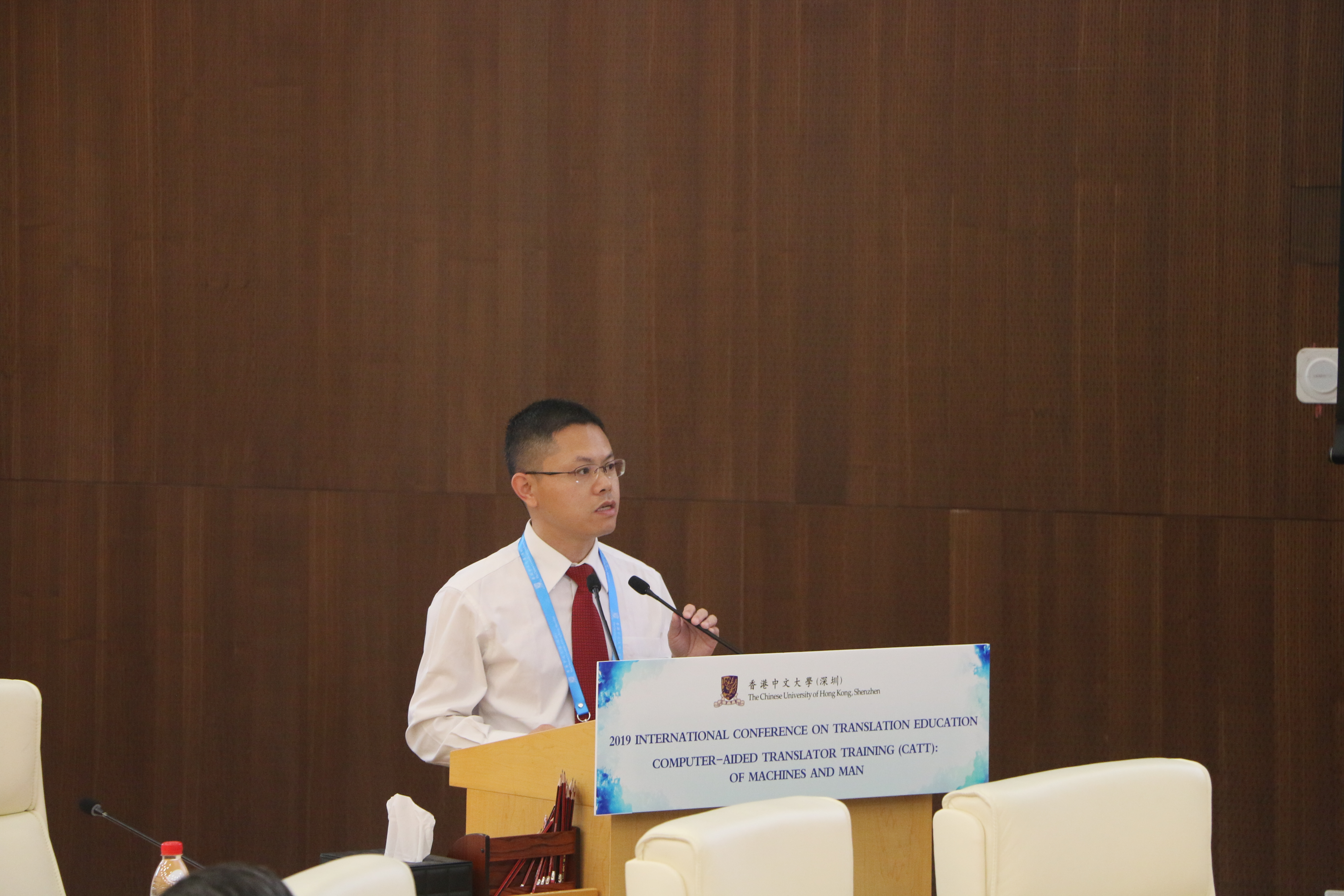
Keynote speech by Professor Wang Binhua
Professor Wang Binhua from the University of Leeds gave a keynote speech entitled Development of Technology in Interpretation and Interpreter Training and Its Implication for Redefining Interpreter Competence. Starting with an overview on the development of technology in interpreting practice, Professor Wang addressed the misty relation between machines and human interpreters in interpreting activities. While pointing out the unfoundedness of the commonly held suspicion that machines will replace human interpreters in the future, he emphasized the constitutive and constructive role technology could play in interpreter training, especially in training content design, tool application and learning environment set-up.

Keynote speech by Professor Chan Sinwai
Professor Chan Sinwai from CUHKSZ delivered a keynote speech entitled Revisiting the Future of Translation Technology. He summarized the overall framework of translation technology, and analyzed advantages, disadvantages and applications of various modalities of translation technology including machine translation, computer-aided translation, localization and speech translation, etc. He also discussed the future of translation technology in a holistic manner.
Parallel Session Presentations
In the two-day parallel sessions, participants were able to exchange ideas, share their research results and discuss on a series of sub-themes including computer-aided translator training, translation technology, machine translation, computer-aided translation, corpus-based translation and interpreting studies, translation pedagogy, and translator assessment.



Workshop
Around 80 participants attended the workshop. In the first half, Dr. Yip Po-ching, former Director of the translation program at the University of Leeds, elaborated ideas about the design and writing of topical boards on Textwells. In the second half, Professor Mu Yuanyuan introduced key modules and functions of Textwells. Participants were all encouraged to try out the platform in the hands-on session of the workshop.


Roundtable Discussion

In the roundtable discussion, keynote speakers and guests were invited to address the following questions as well as any other issues of interest to the audience:
1. What is the difference between text generation systems for written translation, interpreting and those for general writing?
2. How can human individuality be shown in interpersonal communication facilitated by text generation tools?
3. How could machine translation tools be used to better human intelligence and language competence?
4. The design of an open system: collective endeavor vs. individual efforts.
5. Is immediacy a temporal or spatial concern? Would it conflict with mobility in actual translation or interpreting practice?
6. The role of crowdsourcing in the design and construction of corpora for translator and interpreter training?
7. How to determine the proportion of CAT components in human-oriented translator training programs?
Closing Ceremony
At the closing ceremony, Professor Zhu Chunshen, Mr. Chang Shaohua from Foreign Languages in China, and Professor Wang Binhua respectively made closing remarks. On behalf of the host of the next International Conference on Translation Education, Professor Hu Kaibao announced that the next conference will be held at Shanghai International Studies University from November 20-22, 2020. After two days of constructive discussions and exchanges, the 2019 International Conference on Translation Education concluded with success.
For more information. Videos of the conference are available on the TTV website at http://ttv.cn/special-column/icte-2019。

